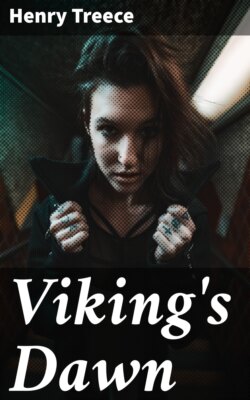Читать книгу Viking's Dawn - Henry Treece - Страница 3
На сайте Литреса книга снята с продажи.
1 The Hall
by the Tarn
ОглавлениеTable of Contents
Two figures stood in the darkness, a man and a boy. Behind them the pine woods sighed, as though overcome by a great and unnamable sadness, the melancholy sound made by all ancient forests. As the round moon came from behind a bank of cloud, throwing its silver light over the rough and rocky land below, the two figures peered down into the valley beneath them, their heavy cloaks sweeping away from them in the night wind that blew toward them from the woods. A great white sea bird circled above their heads, crying harshly and pitifully in the moonlight. They shuddered at the sound, looking up in dread. The man’s bearded lips moved silently, as though he spoke a charm against the witches of the night. The moon slowly withdrew behind the straggling cloud bank, and for a moment there was utter darkness once more.
Then suddenly, from the valley, came a surge of flame, a great red and orange spurting-up of light. A thick cloud of oily smoke rose above it, into the night air. A flock of birds flew, twittering up from the valley, to the woods. The two watchers drew in their breath as the many wings beat above them in the darkness.
Now the fire-glow spread and its angry light flared out over a black tarn nearby, so that the man and boy saw reflected in the somber water every shape and hue of the flames.
The man licked his lips and said, “His hall burns well, son. When we laid the logs for him, I did not think we should see such a sending-off fire.”
The boy said, “Such a king as he does not deserve a funeral fire like that. A king who has no ship to take him to Odin is not worth following. Better a man should go a-viking for himself.”
The man looked angry for a space. Then he smiled and said, “It would go hard with us old ones if you young cocks ruled the world! Gudröd could not help being a poor man. There are too many kings in the land, lad; and not all of them can be rich men. My choice fell out badly, to pledge myself to a poor man, that is all. Yet, no doubt, Odin will receive Gudröd in Valhalla no less courteously because he sails there in a burning house than if he came in a long ship!”
The boy frowned and said, “You served him too faithfully, Father. We should have left him before the famine came. When his corn failed, we should have gone to the coastwise Norse and lived off fish. The herring never fail.”
Now the fire had reached its height and began to slacken. The air about the two was filled with the smell of acrid smoke. Small burnt particles and ashes fell about them. The man wiped his hand across his forehead. His gold arm ring flashed in the glow. He said, “Who is to know? One day the herring might go away. Then what will the fishers do? They will have neither corn nor fish, Harald. How shall a Norseman live then, think you?”
“He will live on his wits, as Odin meant him to, Father,” said the boy. “There are other lands and other folk who have plenty. The Danes have plenty, so have the English. Or a man could voyage overland and take his bread from the Romans. There is no need to starve, Father.”
Now the blaze below them was sinking to a dull glow and the birds were flying back from the wood toward the tarn’s dark waters.
The man said, “Life is never sure, Harald. Whichever way a man turns, he thinks he might have done better to take the other path.”
The boy frowned and shut his eyes tight, as though squeezing the sudden tears from them. “If we had left Gudröd sooner, my mother and brothers might still be alive with us. They would not have died in the famine.”
The man made an impatient movement under his cloak, almost as though his hand would strike the boy, but he answered calmly, “Only Odin knows whether that is true, son. We might have lost them in a village-burning if we had gone to the coast. They might have been chosen as sacrifices when the fishing went badly. We do not know. At least, old Gudröd did not call for sacrifices. That much can be said for him.”
The boy’s voice was bitter. “No, he knew which side his bread was buttered. He had so few followers left that he could not afford to lay any of them on the stones. He might have had to do a hand’s turn himself, if he had done so.”
The man turned away from him, impatiently. “Come, Harald,” he said. “We will make the best of a bad job and find another lord to follow.”
They made their way toward the dark woods, and only once did they turn back to glance at the dying embers of Gudröd’s great hall. As the pine trees enfolded them the man said, “This way lies the fjord, if the beasts of the forest will let us pass.”
The boy said, “Better to become the bear’s supper than to remain the cow’s slave.”
The man smiled grimly, “Who shall say that but one who has found himself on the bear’s dish?”
They spoke no more as they pushed past the overhanging boughs and went into the deep darkness of the forest.
